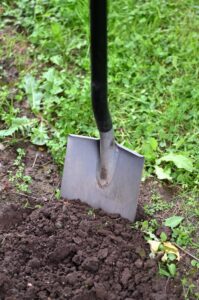 Good soil is essential for healthy plant growth and a productive garden.
Good soil is essential for healthy plant growth and a productive garden.
Here are some reasons why:
- Nutrient availability: Good soil provides essential nutrients, such as nitrogen, phosphorus, and potassium, that plants need for healthy growth and fruit or vegetable production.
- Water retention: Good soil can hold moisture, allowing plants to access water and stay hydrated during dry periods.
- Drainage: Good soil allows excess water to drain away, preventing waterlogged conditions that can lead to root rot and other plant diseases.
- Aeration: Good soil contains air pockets that allow plant roots to breathe and access oxygen.
- Microbial activity: Good soil is alive with microorganisms that help break down organic matter and release nutrients for plants to use.
- pH balance: Good soil has a pH balance that is suitable for the types of plants you want to grow. Most plants prefer a slightly acidic soil with a pH between 6.0 and 7.0.
In summary, good soil provides the necessary nutrients, water, and oxygen for plant growth, while also preventing waterlogging and providing a healthy environment for beneficial microorganisms.
Does South Jersey have good soil for gardens?
South Jersey has a range of soil types, including sandy loam, clay, and silt loam. The quality of soil can vary depending on the specific location and site conditions. However, many areas of South Jersey have fertile soil that is suitable for growing a variety of crops, including vegetables, fruits, and ornamental plants. To determine the quality of soil in your specific location, it’s best to consult with a local agricultural extension office or a soil testing lab. These experts can provide detailed information on the soil type, pH, nutrient levels, and any potential issues that may need to be addressed to ensure optimal plant growth.
What is a good soil lab to use to test your soil?
There are several reputable soil testing labs that you can use to test your soil. Here are a few options:
- The Agricultural Analytical Services Laboratory at Penn State University: This lab offers a range of soil testing services, including basic soil testing for pH, nutrients, and organic matter, as well as specialized testing for trace elements, heavy metals, and other contaminants.
- A & L Eastern Agricultural Laboratories: This lab provides comprehensive soil testing services for agricultural, environmental, and urban applications. They offer a range of testing packages to meet specific needs, including soil nutrient analysis, plant tissue analysis, and water testing.
- Midwest Laboratories, Inc.: This lab offers a variety of soil testing services, including basic nutrient analysis, soil health analysis, and specialized testing for heavy metals, pesticides, and other contaminants.
- Spectrum Analytic Inc.: This lab provides comprehensive soil testing services for agriculture, horticulture, and turf management. They offer a range of testing packages to meet specific needs, including soil nutrient analysis, soil texture analysis, and pH testing.
When selecting a soil testing lab, it’s important to choose a reputable and accredited lab that uses reliable testing methods and provides accurate and timely results. It’s also important to follow the lab’s instructions for collecting and submitting soil samples to ensure that the results are representative of your soil conditions.



